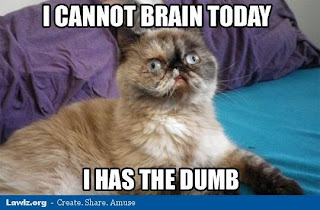I think I broke physics

BigT555
Posts: 2,067 Member
So bear with me here, I was just doing some brain thinking and realized something
if you eat 1 gram of pure fat, thats 9 calories. And to lose 1 lb you need to burn 3500 calories, or conversely to gain a lb you need to eat 3500 calories (above/below TDEE).
so 1 g of fat= 9 cals
9 cals divided by 3500 cals/lbs = 0.0025714285714286 lbs
0.0025714285714286 lbs times 453.592 g's per pound = 1.16637942857 g's
so 1 g of fat eaten = 1.166 g's gained? what happened to conservation of mass and energy?
if you eat 1 gram of pure fat, thats 9 calories. And to lose 1 lb you need to burn 3500 calories, or conversely to gain a lb you need to eat 3500 calories (above/below TDEE).
so 1 g of fat= 9 cals
9 cals divided by 3500 cals/lbs = 0.0025714285714286 lbs
0.0025714285714286 lbs times 453.592 g's per pound = 1.16637942857 g's
so 1 g of fat eaten = 1.166 g's gained? what happened to conservation of mass and energy?
0
Replies
-
Ow..0
-
 0
0 -
Yep... this is why I'm an Engineering Technician, not an Engineer. Same pay, less math.0
-
As a scientist (who nearly failed physics) all I can say is when something is within two tenths like that I just shrug, chalk it up to some math error on somebody's part and say "close enough."0
-

\m/0 -
Wait what??? Lol0
-
Rounding. Your math assumes that fat is precisely 9.0 calories per grams. It's actually slightly higher. Also, the number is different for different fats, and it can range from like 8.7 to 9.5, depending on how long the chains are and how saturated they are.0
-
3500cal / 9 = 388.88 grams of fat / lb
where's the 453.592 g's / lb coming from?0 -
Adipose tissue (body fat) is not made of purely fat (pure lipids, what is counted in dietary fat). Human fat tissue contains about 87% lipids.
edit: Accounting for that, 9 calories/gram*453 grams/lb*0.87 =3547.0 -
Rounding. Your math assumes that fat is precisely 9.0 calories per grams. It's actually slightly higher. Also, the number is different for different fats, and it can range from like 8.7 to 9.5, depending on how long the chains are and how saturated they are.
Edited to add, run your calculations backwards and solve for calories per gram, and you'll have a more precise number to work with.0 -
Rounding. Your math assumes that fat is precisely 9.0 calories per grams. It's actually slightly higher. Also, the number is different for different fats, and it can range from like 8.7 to 9.5, depending on how long the chains are and how saturated they are.
This.0 -
3500 is an estimate.
9 cals per gram is an estimate.
Voila!0 -
9 calories per gram of fat is an approximation which makes it impossible to know just how far off your calculations are. Physics is fine (until CERN finally fires up the LHC again next year and creates a singularity that restarts the universe at another bang).0
-
I'm just unsure of what you're trying to calculate here?? What.0
-
So bear with me here, I was just doing some brain thinking and realized something
if you eat 1 gram of pure fat, thats 9 calories. And to lose 1 lb you need to burn 3500 calories, or conversely to gain a lb you need to eat 3500 calories (above/below TDEE).
so 1 g of fat= 9 cals
9 cals divided by 3500 cals/lbs = 0.0025714285714286 lbs
0.0025714285714286 lbs times 453.592 g's per pound = 1.16637942857 g's
so 1 g of fat eaten = 1.166 g's gained? what happened to conservation of mass and energy?
http://www.myfitnesspal.com/topics/show/1376778-recomp-math
??
ETA: OPs Quote from link above.
So one lb of fat is as much as one lb of muscle its all mass right but that is where the mistake comes in. So let me go over the numbers
1 lb = 453.6g
1g of fat=9 cal
1g of protein= 4 cal
1g of water = 0 cal
This is stuff we all know, we also know that one lb of fat =3500 cal but 453.6g x 9cal= 4082cal. So how can this be right the numbers just don't add up right. The problem is fat is not all "fat", fat is made up of cells, that are mostly made up of water, but they hold a large amount of oil in them. So a lb of fat is made up of about 86% oil so that would about 390g of fat and 63g of water. Ok so more math now.
1lb=453g
390g oil x 9= 3510
63g water x0=0
390g+63g= 453g=1 lb0 -
Technically speaking:
Lard - pure fat - is 905 calories for 100 grams - and even that figure is slightly rounded - so that fraction of a calorie per gram accounts for the variance. 0
0 -
453.592 is the conversion from pounds to grams. what you calculated is the inverse of what i calculated in my first equation;3500cal / 9 = 388.88 grams of fat / lb
where's the 453.592 g's / lb coming from?
3500cals/ lb divided by 9 cals = 388.88 lbs^-1. gotta watch those units0 -

Hahahahahaha! :laugh:0 -
grams / lb are off - 388.888 for fat0
-
Um...
You need to show your work. What in the hell are you talking about? 0
0 -
 0
0 -
 0
0 -

\m/
This. \m/ 0
\m/ 0 -
Estimating and TEF?0
-
The answer is Orange because my cat likes to dance.0
-
lol to everyone asking what i was calculating; its a conversion of the 9 calories contained in a gram of fat to the 3500 calories contained in a pound. basically if you go full circle you get 1 gram of fat eaten yeilding a fat gain of 1.166 g's
im going to assume its some sort of rounding error, but most numbers i got for calories in a gram of fat had a few zeros after the decimal place inferring a higher accuracy than just to one integer0 -
The answer is Orange because my cat likes to dance.
No, the answer is blankets because pigeons don't like spaghetti.0 -
 0
0 -
i totally showed my math!Um...
You need to show your work. What in the hell are you talking about?
though i dont even know what the hell im talking about anymore0 -
...3500 cals/lbs ....
That number is an approximation. Any number ending in double zeros is likely to be.9 calories...
So is that one.0
This discussion has been closed.
Categories
- All Categories
- 1.4M Health, Wellness and Goals
- 398.1K Introduce Yourself
- 44.7K Getting Started
- 261K Health and Weight Loss
- 176.4K Food and Nutrition
- 47.7K Recipes
- 233K Fitness and Exercise
- 462 Sleep, Mindfulness and Overall Wellness
- 6.5K Goal: Maintaining Weight
- 8.7K Goal: Gaining Weight and Body Building
- 153.5K Motivation and Support
- 8.4K Challenges
- 1.4K Debate Club
- 96.5K Chit-Chat
- 2.6K Fun and Games
- 4.8K MyFitnessPal Information
- 12 News and Announcements
- 21 MyFitnessPal Academy
- 1.5K Feature Suggestions and Ideas
- 3.2K MyFitnessPal Tech Support Questions




















